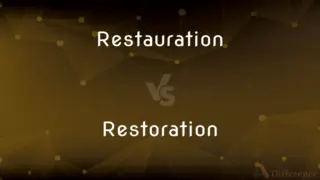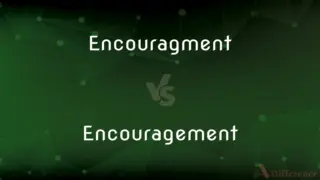Abondon vs. Abandon — Which is Correct Spelling?
By Tayyaba Rehman — Updated on March 27, 2024
"Abondon" is an incorrect spelling. The right spelling is "Abandon," meaning to leave behind or give up on someone or something.
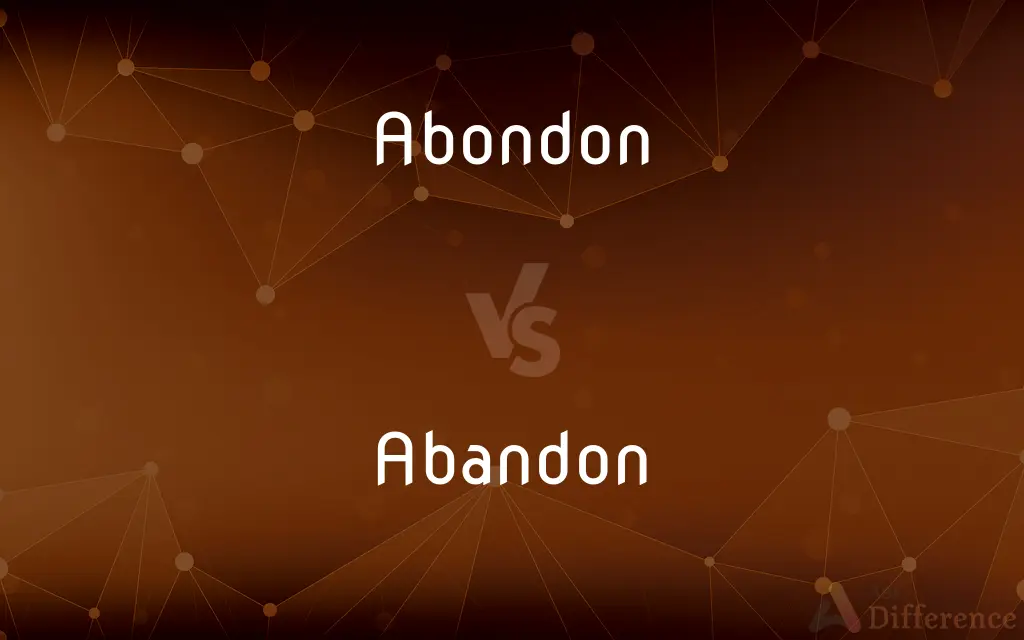
Table of Contents
Which is correct: Abondon or Abandon
How to spell Abandon?

Abondon
Incorrect Spelling

Abandon
Correct Spelling
ADVERTISEMENT
Key Differences
Recall the association: "Band" is at the heart of "Abandon."
Visualize: "Abandon" has only two 'a's and one 'o.'
The correct spelling, "Abandon," contains just one "o."
Think of "Abandon" as "A-band-on," highlighting the "band."
Remember: A ship is ABANDONed, not ABONDOed.
ADVERTISEMENT
How Do You Spell Abandon Correctly?
Incorrect: He had to abondon his car in the snowstorm.
Correct: He had to abandon his car in the snowstorm.
Incorrect: She couldn't abondon her dreams of becoming an artist.
Correct: She couldn't abandon her dreams of becoming an artist.
Incorrect: They decided to abondon the old house in the countryside.
Correct: They decided to abandon the old house in the countryside.
Abandon Definitions
To leave a place or vehicle empty or uninhabited.
The building was abandoned years ago.
To cease or discontinue an action or endeavor.
They decided to abandon the project due to lack of funds.
To withdraw one's support or help from, especially in spite of duty, allegiance, or responsibility; desert
Abandon a friend in trouble.
To give up by leaving or ceasing to operate or inhabit, especially as a result of danger or other impending threat
Abandoned the ship.
To surrender one's claim to, right to, or interest in; give up entirely
Abandon a belief.
To cease trying to continue; desist from
Abandoned the search for the missing hiker.
To yield (oneself) completely, as to emotion.
Great enthusiasm or lack of restraint
Skied with abandon.
(transitive) To give up or relinquish control of, to surrender or to give oneself over, or to yield to one's emotions.
(transitive) To desist in doing, practicing, following, holding, or adhering to; to turn away from; to permit to lapse; to renounce; to discontinue.
(transitive) To leave behind; to desert, as in a ship, a position, or a person, typically in response to overwhelming odds or impending dangers; to forsake, in spite of a duty or responsibility.
Many baby girls have been abandoned on the streets of Beijing.
She abandoned her husband for a new man.
To subdue; to take control of.
To cast out; to banish; to expel; to reject.
(transitive) To no longer exercise a right, title, or interest, especially with no interest of reclaiming it again; to yield; to relinquish.
I hereby abandon my position as manager.
(transitive) To surrender to the insurer (an insured item), so as to claim a total loss.
A yielding to natural impulses or inhibitions; freedom from artificial constraint, with loss of appreciation of consequences.
(obsolete) abandonment; relinquishment.
To cast or drive out; to banish; to expel; to reject.
That he might . . . abandon them from him.
Being all this time abandoned from your bed.
To give up absolutely; to forsake entirely ; to renounce utterly; to relinquish all connection with or concern on; to desert, as a person to whom one owes allegiance or fidelity; to quit; to surrender.
Hope was overthrown, yet could not be abandoned.
Reflexively: To give (one's self) up without attempt at self-control; to yield (one's self) unrestrainedly; - often in a bad sense.
He abandoned himself . . . to his favorite vice.
To relinquish all claim to; - used when an insured person gives up to underwriters all claim to the property covered by a policy, which may remain after loss or damage by a peril insured against.
Abandonment; relinquishment.
A complete giving up to natural impulses; freedom from artificial constraint; careless freedom or ease.
The trait of lacking restraint or control; freedom from inhibition or worry;
She danced with abandon
A feeling of extreme emotional intensity;
The wildness of his anger
Forsake, leave behind;
We abandoned the old car in the empty parking lot
Stop maintaining or insisting on; of ideas, claims, etc.;
He abandoned the thought of asking for her hand in marriage
Both sides have to give up some calims in these negociations
Give up with the intent of never claiming again;
Abandon your life to God
She gave up her children to her ex-husband when she moved to Tahiti
We gave the drowning victim up for dead
Leave behind empty; move out of;
You must vacate your office by tonight
Leave someone who needs or counts on you; leave in the lurch;
The mother deserted her children
To give up or desert, especially in a situation of responsibility or trust.
She had to abandon her car in the snowstorm.
A complete surrender of inhibitions.
He danced with wild abandon.
To forsake or renounce completely.
He abandoned his family.
Abandon Meaning in a Sentence
They were forced to abandon the sinking ship.
They had to abandon their home due to the flood.
Parents were warned not to abandon their children in hot cars.
Abandon Idioms & Phrases
With reckless abandon
Acting without thinking about the consequences.
They danced with reckless abandon, forgetting everything around them.
Abandon hope
To lose all hope.
Despite the dire situation, they refused to abandon hope.
Abandon ship
To leave a failing or troubled situation quickly.
When the startup's funds dried up, the investors were ready to abandon ship.
Common Curiosities
Why is it called Abandon?
It comes from the Old French "abandoner" meaning to surrender or relinquish.
What is the root word of Abandon?
The root is from Old French "abandoner."
What is the pronunciation of Abandon?
The pronunciation is /əˈbændən/.
What is the plural form of Abandon?
Abandons (when referring to instances of abandonment).
Is Abandon an abstract noun?
Yes, when referring to a complete surrender of inhibitions.
Which vowel is used before Abandon?
Any vowel can precede "Abandon" depending on the context.
What is the verb form of Abandon?
Abandon.
What is the singular form of Abandon?
Abandon.
Is Abandon a countable noun?
When referring to instances of abandonment, yes.
Which article is used with Abandon?
Both "a" and "the" can be used.
Is Abandon a negative or positive word?
Generally negative.
Is the Abandon term a metaphor?
It can be used metaphorically in certain contexts (e.g., "dance with abandon").
What is the first form of Abandon?
Abandon.
Which preposition is used with Abandon?
"Of" (e.g., abandon of hope).
Which conjunction is used with Abandon?
Any conjunction can be used depending on the context.
Is Abandon a noun or adjective?
"Abandon" can be both a noun and a verb.
What is another term for Abandon?
Forsake or desert.
Is Abandon a vowel or consonant?
"Abandon" is a word that contains both vowels and consonants.
How do we divide Abandon into syllables?
A-ban-don.
What is a stressed syllable in Abandon?
The second syllable, "ban."
What part of speech is Abandon?
Abandon can be a noun or verb.
How is Abandon used in a sentence?
She chose to abandon her old habits and start anew.
Is Abandon a collective noun?
No.
Is the word Abandon is Gerund?
No, but "abandoning" is the gerund form.
How many syllables are in Abandon?
Three syllables.
What is the third form of Abandon?
Abandoned.
Is Abandon an adverb?
No.
Is the word Abandon is imperative?
It can be, e.g., "Abandon the ship!"
Is the word “Abandon” a Direct object or an Indirect object?
"Abandon" can be used as a direct object (e.g., "I had to abandon my plan").
What is the opposite of Abandon?
Retain or embrace.
Which determiner is used with Abandon?
"This," "that," "his," "her," etc., can be used.
What is the second form of Abandon?
Abandoned.
Share Your Discovery
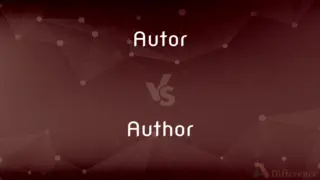
Previous Comparison
Autor vs. Author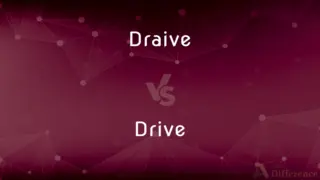
Next Comparison
Draive vs. DriveAuthor Spotlight
Written by
Tayyaba RehmanTayyaba Rehman is a distinguished writer, currently serving as a primary contributor to askdifference.com. As a researcher in semantics and etymology, Tayyaba's passion for the complexity of languages and their distinctions has found a perfect home on the platform. Tayyaba delves into the intricacies of language, distinguishing between commonly confused words and phrases, thereby providing clarity for readers worldwide.










